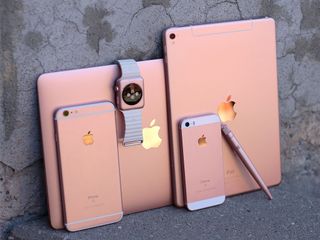Apple drives carbon-free aluminum smelting for the future of iPhone and us

Aluminium. We think about it in terms of how durable it is. What the number is. What the grade is. We marvel when it's linked to aerospace and we swoon when it's anodized gold, rose gold, or somehow made jet black. We hold it and feel it as part of our iPhones and iPads and Macs. And we appreciate it. But we seldom, if ever, think about it. Especially in terms of its impact on the environment.
And why should we? It's not like aluminum has changed in the last century or more.
But Apple has been thinking about it. Deeply. As part of its ongoing environmental initiatives — or imperatives — Apple isn't contenting itself to do things one way just because that's how they've always been done. No. Apple is actively seeking to change things for the better. It's very literally putting its resources — and the most successful product manufacturing pipeline in history — where its mouth is.
Apple has previously effused over how seriously it takes aluminum performance (see the Apple Watch video, above). Now it's giving the spotlight to aluminum responsibility and impact.
Here's how Apple describes what happened:
Apple's involvement started in 2015, when three of its engineers went in search of a cleaner, better way of mass producing aluminum.After meeting with the biggest aluminum companies, independent labs, and startups around the world, Apple engineers Brian Lynch, Jim Yurko, and Katie Sassaman found their answer at Alcoa Corporation.Aluminum has been mass produced the same way since 1886, when it was pioneered by Alcoa's founder, Charles Hall. The process involves applying a strong electrical current to alumina, which removes oxygen. Both Hall's original experiments and today's largest smelters use a carbon material that burns during the process, producing greenhouse gases.Lynch, Yurko and Sassaman learned that Alcoa had designed a completely new process that replaces that carbon with an advanced conductive material, and instead of carbon dioxide, it releases oxygen. The potential environmental impact was huge, and to help realize it quickly, Alcoa needed a partner.That's when David Tom, Maziar Brumand, and Sean Camacho in Apple business development brought Rio Tinto to the table. Rio Tinto had a robust worldwide presence as well as deep experience in smelting technology development and international sales and commercialization.Together, the two aluminum companies formed a joint venture called Elysis, which will work to develop this technology further for larger scale production and commercialization, with a package planned for sale beginning in 2024. Apple will continue to provide technical support as well.
Releasing oxygen instead of burning it. Amazing.

Here's how Alcoa and Rio Tinto describe Elysis working:
Master your iPhone in minutes
iMore offers spot-on advice and guidance from our team of experts, with decades of Apple device experience to lean on. Learn more with iMore!
Elysis, which will be headquartered in Montreal with a research facility in Quebec's Saguenay–Lac-Saint-Jean region, will develop and license the technology so it can be used to retrofit existing smelters or build new facilities. When fully developed and implemented, it will eliminate direct greenhouse gas emissions from the smelting process and strengthen the closely integrated Canada-United States aluminum and manufacturing industry. The new joint venture company will also sell proprietary anode and cathode materials, which will last more than 30 times longer than traditional components. As a Montrealer, it gives me enormous pride to see the city, province, and country working together to support this initiative. As an Apple customer, I'm heartened that products I buy, and thus the company I support, isn't passive when it comes to these issues. It isn't settling on what is — it's actively helping make what will be better.
Apple's CEO, Tim Cook:
"Apple is committed to advancing technologies that are good for the planet and help protect it for generations to come," said Tim Cook, Apple's CEO. "We are proud to be part of this ambitious new project, and look forward to one day being able to use aluminum produced without direct greenhouse gas emissions in the manufacturing of our products."
Canadian Prime Minister Justin Trudeau and Quebec Premier Philippe Couillard, and Apple Senior Director of Operations and Environmental Initiatives Sarah Chandle announced all of this today at the facility in Saguenay, Quebec.
It'll be years until I'm holding an iPhone or iPad or MacBook made with this new process but, if Apple wasn't actively driving these technologies, it could be years more. What we buy is only part of the story of our future. Who makes it and how it's made are the other parts.
A few years ago, if someone asked me why I was buying and supporting Apple, I'd just say because they make great experiences and cool tech. Now I'm more likely to say because they actively seek to make the world a better place beyond just the great experiences and cool tech.
Smelt on, Apple. Smelt. On.

Rene Ritchie is one of the most respected Apple analysts in the business, reaching a combined audience of over 40 million readers a month. His YouTube channel, Vector, has over 90 thousand subscribers and 14 million views and his podcasts, including Debug, have been downloaded over 20 million times. He also regularly co-hosts MacBreak Weekly for the TWiT network and co-hosted CES Live! and Talk Mobile. Based in Montreal, Rene is a former director of product marketing, web developer, and graphic designer. He's authored several books and appeared on numerous television and radio segments to discuss Apple and the technology industry. When not working, he likes to cook, grapple, and spend time with his friends and family.
Most Popular





